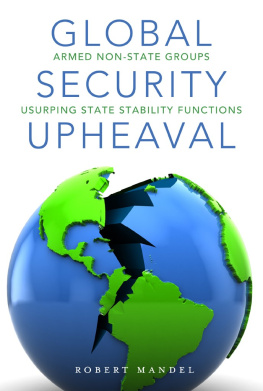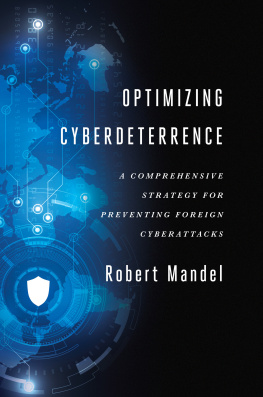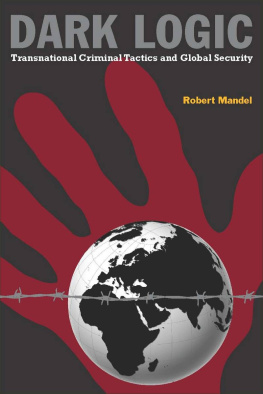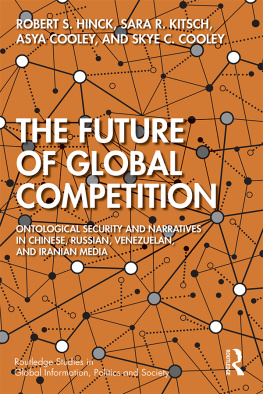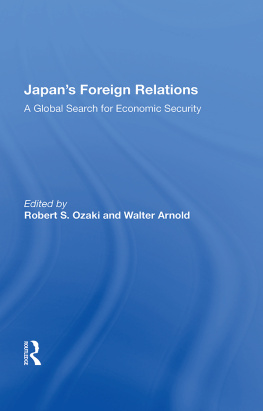Stanford University Press
Stanford, California
2013 by the Board of Trustees of the Leland Stanford Junior University. All rights reserved.
No part of this book may be reproduced or transmitted in any form or by any means, electronic or mechanical, including photocopying and recording, or in any information storage or retrieval system without the prior written permission of Stanford University Press.
Special discounts for bulk quantities of Stanford Security Studies are available to corporations, professional associations, and other organizations. For details and discount information, contact the special sales department of Stanford University Press. Tel: (650) 736.1782, Fax: (650) 736.1784
Printed in the United States of America on acid-free, archival-quality paper
Library of Congress Cataloging-in-Publication Data
Mandel, Robert
Global security upheaval : armed nonstate groups usurping state stability functions / Robert Mandel.
pages cm
Includes bibliographical references and index.
ISBN 978-0-8047-8497-9 (cloth : alk. paper)ISBN 978-0-8047-8498-6 (pbk. : alk. paper)
ISBN 978-0-8047-8649-2 (e-book)
1. Security, International. 2. Non-state actors (International relations) 3. Political stability. I. Title.
JZ5588.M365 2013
355.033dc23
2012038607
Typeset by Newgen in 10/14 Minion
Global Security Upheaval
Armed Nonstate Groups Usurping State Stability Functions
Robert Mandel
Stanford Security Studies, An Imprint of Stanford University Press
Stanford, California
Contents
Illustrations
Figures
Tables
Acknowledgments
This studymy eleventh bookis the product of years of deep pondering. It represents the next step in my continuing intellectual journey through the key dimensions of postCold War post-9/11 global disorder. The relationship between armed nonstate groups and stability links up with many of todays most pressing global security concerns.
Compared to my previous books, this study dramatically shakes up core security assumptions, and for that reason the scope of this undertaking was huge, requiring familiarity with several disparate bodies of literature. An investigation of this magnitude can rarely be executed successfully without outside help. I wish to thank my two undergraduate student research assistants, Marie Steinrcke and Alexis Frisbie, for considerable help with the case studies and for refinement of some of the general ideas. My conversations with my colleagues at other institutions, especially Phil Williams, Troy Thomas, and Bill Casebeer, were absolutely invaluable. At my own institution, I wish to thank Heather Smith-Cannoy for her constant enthusiastic encouragement on this project. Geoffrey Burn, the security studies editor for Stanford University Press, was once again exceptional in his kindness, humor, compassion, and support throughout this books rather lengthy review process. Beyond examining the published literature, numerous conversations with several colleagues in government intelligence and defense organizations have significantly contributed to my thinking, and they all deserve thanks. However, I take full responsibility for any egregious errors found in this volume.
This book is dedicated to those academic scholars and government policy makers who are eager and able to question prevailing global security assumptions (rather than to defer and conform to popular schools of thought) and who are open to outside-the-box iconoclastic thinking rather than conventional modes of analysis. Despite the illusion of receptivity to unorthodox ways of looking at the world, many positive and negative incentives draw analysts to try to fit into dominant ways of thinking instead of truly questioning what they read and hear regardless of the prestige of the sources; and to stick with narrow and safer topics of inquiry rather than going out on a limb to boldly challenge what has come beforehand. My hat goes off to those who avoid this inertia-laden trap and have the courage to be truly creative in the security realm.
INTRODUCTION
Analytical Focus
This study challenges the prevailing understanding of how security provision works within the contemporary international system. Conventional thinking about international stability rests on five main assumptions: (1) states and intergovernmental organizations are the dominant locus of authority in global society, Both scholars and policy makers have relied on these tried-and-true premises for centuries.
Since the end of the Cold War in 1989, central state governments have typically been considered the most important or even the sole sources of stability, and subnational and transnational nonstate forces have been identified as a major source of global instability, facilitating ominous disruptive flows of people, goods, and services that have moved readily across international boundaries. Although these claims have some validity, both contentions appear to be too sweeping. In a world where it is possible to identify the devolution of authority from the state to armed nonstate groups, these mainstream security beliefs merit reexamination.
So in contrast, this study calls into question all five commonly held contentions about global stability. A careful assessment of prevailing assumptions and recent real-world trends creates a startling set of counterpropositions: (1) areas exist where it makes little sense to rely on central state governments for stability; (2) attempts to bolster such governments to promote stability often prove to be futile; (3) armed nonstate groups can sometimes provide local stability better than states; (4) power-sharing arrangements between states and armed nonstate groups may sometimes be viable; and (5) these changes in the international setting call for major analytical shifts and significant deviation from standard responses. summarizes the differences between conventional and unconventional thinking about stability promotion. These differences reveal a drastic rather than an incremental shift in thinking about global security, one that creates challenges for policy that call for nothing less than a new security framework promoting global order.

Figure 1.1. Conventional and unconventional security orientations
CENTRAL THRUST
This studys central thrust is to analyze conceptually and empirically the ongoing global shift in security governance from public to private hands. It focuses on when this shift is most and least conducive to stability, when armed non-state groups are most and least effective in promoting stability, and when power sharing between central state governments and armed nonstate groups makes the most and least sense. Thus this investigation emphasizes a fluid emergent actor approach rather than a reification of the state system, addressing a crucial security gap in understanding the opportunities and dangers posed by nontraditional coercive sources of authority in international relations.
The two pivotal focal points in this study are stability and armed non-state groups. When considering stability, the study concentrates on the role of armed nonstate groups; and when considering these groups, it concentrates on their impact on stability. This investigation deemphasizes other nonstate stability sources, including noncoercive subnational and transnational groups; and other outcomes, including justice and human rights. Throughout, there is awareness that the relationship between the studys two main concepts is both two-way and dynamically interactivebesides the impact of armed nonstate groups on stability, the presence or absence of stability may affect the likelihood of emergence and strength of armed nonstate groups.


